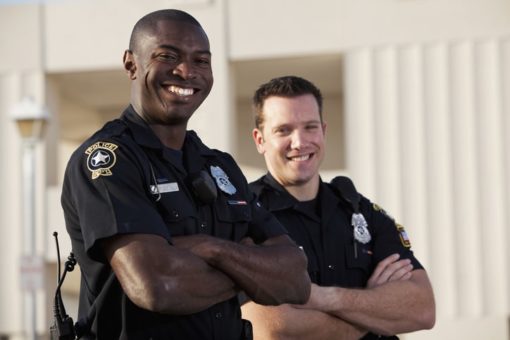 One in five adults will experience mental illness in a given year. Mental illness affects everyone directly or indirectly through family, friends, or coworkers. Since 1990, when Congress officially established the first full week of October as Mental Illness Awareness Week (MIAW), advocates have worked together to sponsor activities, large or small, to educate the public about mental illness. October 6-12, 2019 is a week dedicated to raising awareness about mental health, breaking the stigma associated with treatment, and educating the public on the importance of both prevention and treatment. Mental health disorders, whether depression, anxiety, bipolar disorder, or schizophrenia, carry a general stigma that only specific individuals are susceptible to being diagnosed with one of these disorders when reality anyone, regardless of age, gender, profession, or social status, is at risk. This holds even for community heroes such as police officers. In fact, according to statistics, more police officers have died this year by suicide than in the line of duty, and according to statistics, 120 police officers have been killed by suicide this year alone. Suicide is linked to mental health disorders, and the majority of individuals who take their own lives do so as a way to end their suffering. Compared to the general population, law enforcement officers report much higher rates of depression, PTSD, burnout, and other anxiety-related mental health conditions.
One in five adults will experience mental illness in a given year. Mental illness affects everyone directly or indirectly through family, friends, or coworkers. Since 1990, when Congress officially established the first full week of October as Mental Illness Awareness Week (MIAW), advocates have worked together to sponsor activities, large or small, to educate the public about mental illness. October 6-12, 2019 is a week dedicated to raising awareness about mental health, breaking the stigma associated with treatment, and educating the public on the importance of both prevention and treatment. Mental health disorders, whether depression, anxiety, bipolar disorder, or schizophrenia, carry a general stigma that only specific individuals are susceptible to being diagnosed with one of these disorders when reality anyone, regardless of age, gender, profession, or social status, is at risk. This holds even for community heroes such as police officers. In fact, according to statistics, more police officers have died this year by suicide than in the line of duty, and according to statistics, 120 police officers have been killed by suicide this year alone. Suicide is linked to mental health disorders, and the majority of individuals who take their own lives do so as a way to end their suffering. Compared to the general population, law enforcement officers report much higher rates of depression, PTSD, burnout, and other anxiety-related mental health conditions.
Mental health among police officers
Law enforcement officers are a unique population (like military personnel and other first responders) who experience coexisting medical and behavioral health issues that go hand in hand with job-related stressors. According to a landmark study published by researcher John Violanti with the University at Buffalo in 2012, various factors contribute to the very serious physical and mental health concerns experienced by many law enforcement officers. These factors include:
- Shift work
- Long hours
- Unpredictable schedules
- Exposure to critical incidents
- Being the frequent focus of public attention and criticism
- Various physical demands
- High rates of on-the-job injuries
Depression in the police force
Studies have shown that police officers are more at risk for depression compared to the general population because of the high stress that comes with the job. Police officers are also likely to hide their symptoms and are less likely to seek treatment due to the stigma associated with mental health disorders. Many officers are scared their reputation will be ruined, they will look weak or they will lose their job if they admit they are struggling with signs and symptoms of depression. Depression is the leading cause of suicide among police officers and seeking help cannot only potentially save their life but also protect the public for potentially unsafe policing. Depression is a silent killer in law enforcement because it often builds up slowly, unnoticed, due to constant work-related fatigue and other stressors. In some cases, it is dismissed as just feeling down or under the weather. Common signs of depression among police officers include the following:
- Withdrawing from other officers
- Feeling sad and hopeless for more than a few days
- Lack of energy, enthusiasm, and motivation
- Trouble concentrating
- Reckless drinking of alcohol
- Trouble making decisions
- Being restless, agitated, and irritable
- Weight gain or loss out of the norm
- Sleeping more than usual (sometimes all day)
- Lapses in memory (out of character)
- Feeling bad about yourself or feeling guilty (signs that last for more than a few days)
- Anger and rage over something trivial (out of character)
- Feeling that you can’t overcome difficulties in your life
- Trouble functioning in your personal life (department discipline issues, divorce, the recent loss of immediate family member)
- Openly talks about suicide
- Taking unnecessary risks
Barriers to mental health treatment in the police force
Despite making significant strides in its response to the mentally ill, law enforcement lags when those in pain are their own. Fearful of being considered weak or untrustworthy, concerned that seeking help will lead to sanctions or loss of professional opportunities. Often being worried on how they will be perceived, officers are unlikely to seek help even privately. Doubting their treatment will remain confidential or be understood.
Kristen Fuller, M.D., is a clinical content writer and enjoys writing about evidence-based topics in the cutting-edge world of mental health and addiction medicine. She is a family medicine physician and author, who also teaches and contributes to medicine board education. Her passion lies within educating the public on preventable diseases including mental health disorders and the stigma associated with them. She is also an outdoor activist and spends most of her free time empowering other women to get outside into the backcountry.
